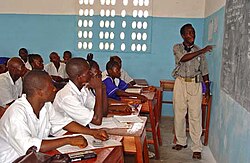National Teacher

A teacher in a classroom at a secondary school in Pendembu, Sierra Leone.
|
|
| Occupation | |
|---|---|
| Names | Teacher, schoolteacher |
|
Occupation type
|
Profession |
|
Activity sectors
|
Education |
| Description | |
| Competencies | Pedagogy, subject knowledge; competence in teaching the subject, in curriculum, in learner assessment; psychology; planning; leadership. |
|
Education required
|
(varies by country) Teaching certification |
|
Related jobs
|
Professor, academic, lecturer, tutor |
A teacher (also called a school teacher or, in some contexts, an educator) is a person who helps others to acquire knowledge, competences or values.
Informally the role of teacher may be taken on by anyone (e.g. when showing a colleague how to perform a specific task). In some countries, teaching young people of school age may be carried out in an informal setting, such as within the family, (homeschooling) rather than in a formal setting such as a school or college. Some other professions may involve a significant amount of teaching (e.g. youth worker, pastor).
In most countries, formal teaching is usually carried out by paid professional teachers. This article focuses on those who are employed, as their main role, to teach others in a formal education context, such as at a school or other place of initial formal education or training.
A teacher's role may vary among cultures.
Teachers may provide instruction in literacy and numeracy, craftsmanship or vocational training, the arts, religion, civics, community roles, or life skills.
Formal teaching tasks include preparing lessons according to agreed curricula, giving lessons, and assessing pupil progress.
A teacher's professional duties may extend beyond formal teaching. Outside of the classroom teachers may accompany students on field trips, supervise study halls, help with the organization of school functions, and serve as supervisors for extracurricular activities. In some education systems, teachers may have responsibility for student discipline.
Teaching is a highly complex activity. This is in part because teaching is a social practice, that takes place in a specific context (time, place, culture, socio-political-economic situation etc.) and therefore reflects the values of that specific context. Factors that influence what is expected (or required) of teachers include history and tradition, social views about the purpose of education, accepted theories about learning etc.
...
Wikipedia
